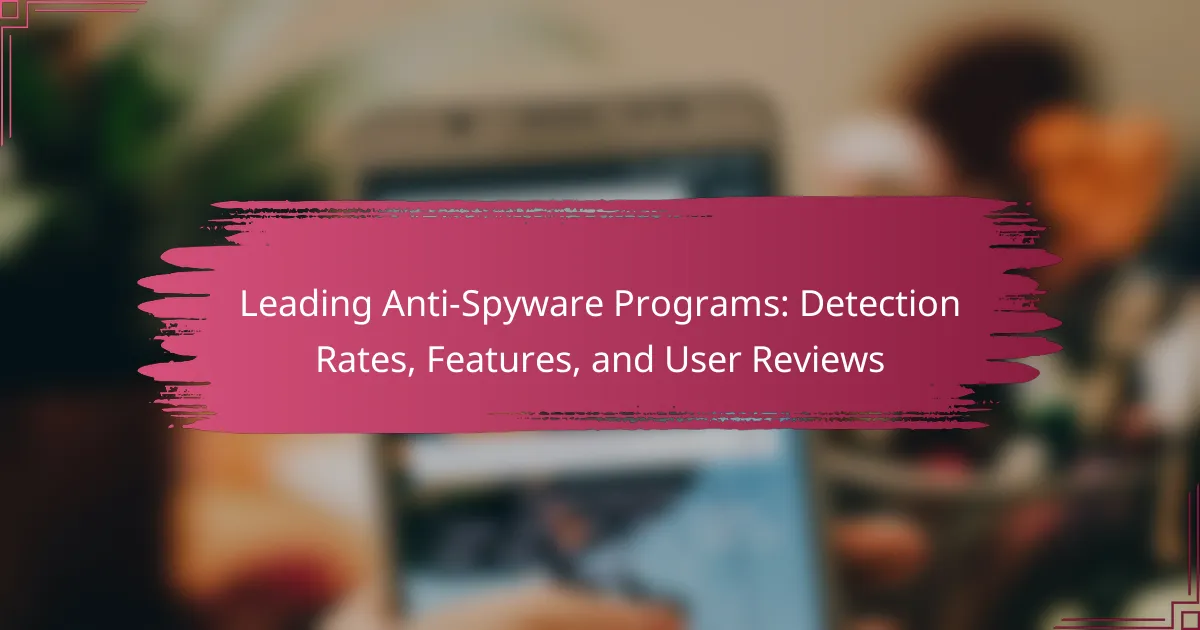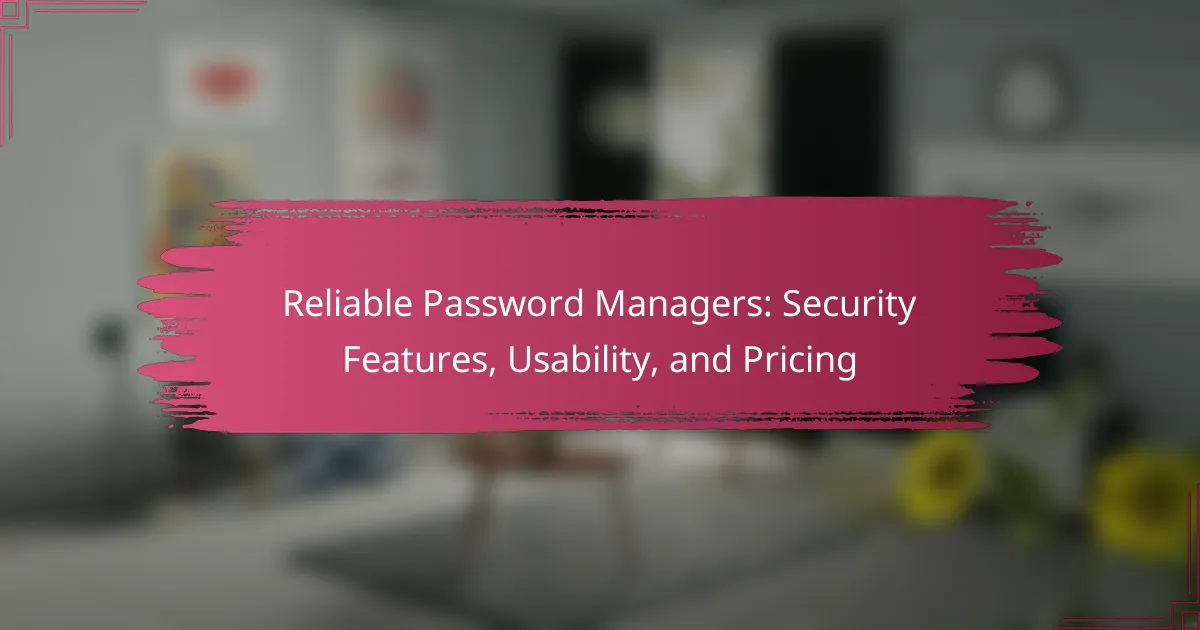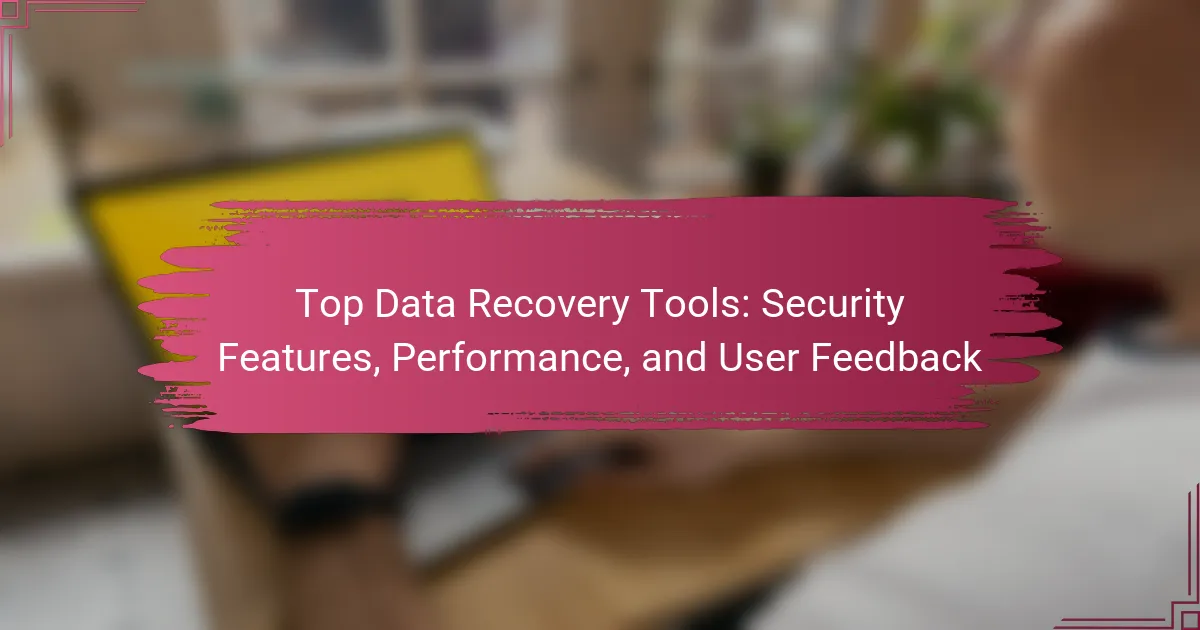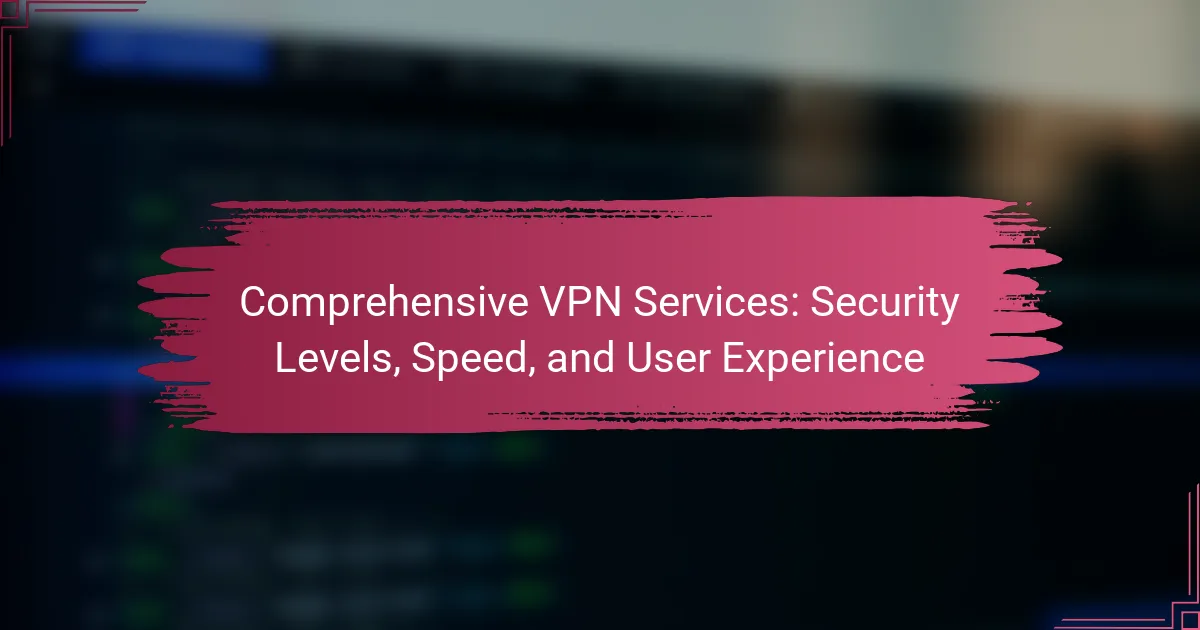Antivirus software is a crucial program designed to detect, prevent, and remove malware from computers and networks. This article outlines the essential features of top antivirus software, including real-time protection, malware detection, user-friendly interfaces, and additional capabilities like firewall and phishing protection. It also emphasizes the importance of regular updates and multi-device support to ensure comprehensive cybersecurity. Furthermore, user ratings and reviews play a significant role in influencing consumer choices, with high ratings indicating trust and satisfaction. The effectiveness of antivirus solutions, as reported by AV-TEST, underscores their necessity in safeguarding against over 99% of malware threats.
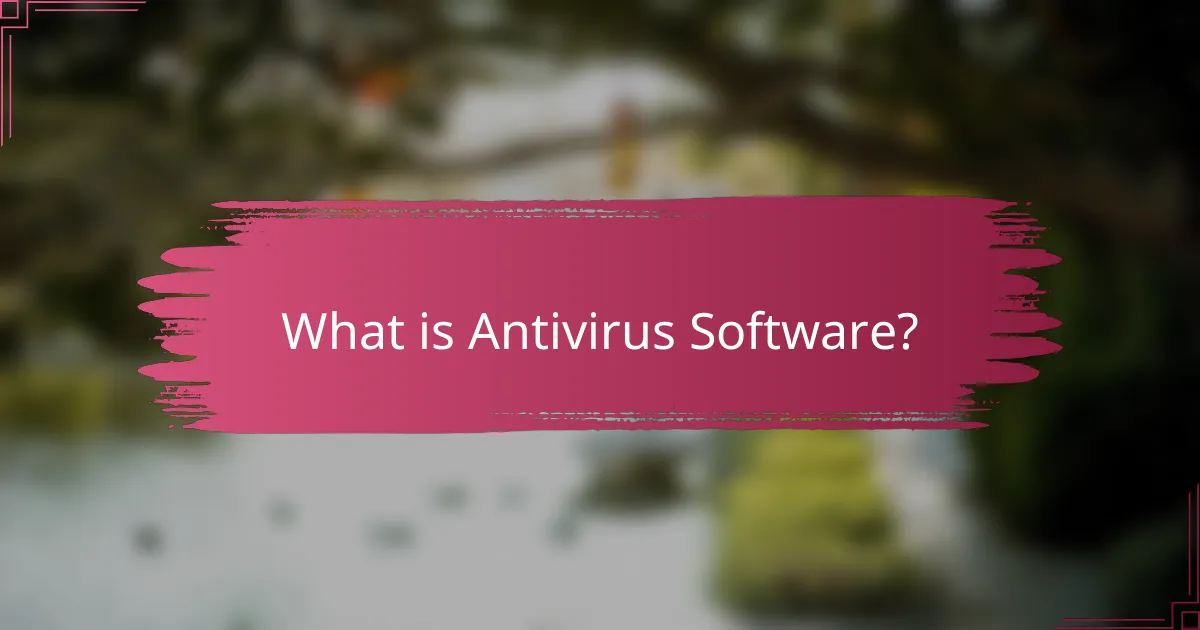
What is Antivirus Software?
Antivirus software is a program designed to detect, prevent, and remove malware from computers and networks. It scans files and applications for known threats. Antivirus software uses signature-based detection, heuristic analysis, and behavior monitoring. Signature-based detection identifies malware by comparing files to a database of known threats. Heuristic analysis looks for suspicious behavior in files. Behavior monitoring observes real-time activity to catch new or unknown malware. According to a report by AV-TEST, antivirus software can block over 99% of malware threats. This effectiveness reinforces the necessity of using antivirus software for cybersecurity.
How does Antivirus Software function to protect devices?
Antivirus software functions by detecting, preventing, and removing malicious software from devices. It scans files and programs for known malware signatures and heuristics. When a threat is identified, the software can quarantine or delete it. Real-time protection monitors system activity continuously. This proactive approach helps block threats before they can cause harm. Regular updates ensure the software recognizes the latest threats. According to AV-TEST, leading antivirus solutions can detect over 99% of known malware. This effectiveness reinforces the importance of using antivirus software for device protection.
What are the key components of Antivirus Software?
The key components of antivirus software include malware detection, real-time protection, and automatic updates. Malware detection identifies and removes harmful software. Real-time protection actively scans files and programs as they are accessed. Automatic updates ensure the software has the latest virus definitions. Additional components may include a firewall, email scanning, and web protection. These features work together to safeguard systems against various cyber threats. Research shows that antivirus software can reduce malware infections by up to 70% when regularly updated.
How do these components interact to detect threats?
Antivirus software components interact through a layered approach to detect threats. The scanning engine identifies malicious files by comparing them against a database of known threats. Real-time protection monitors system activity for suspicious behavior. Heuristic analysis evaluates the behavior of unknown files. Behavioral detection identifies anomalies in application behavior. Together, these components provide comprehensive coverage. Research shows that multi-layered detection significantly increases threat identification rates. For instance, a study by AV-TEST found that layered security solutions improve malware detection by over 90%.
What are the primary benefits of using Antivirus Software?
Antivirus software primarily protects devices from malware and cyber threats. It detects, quarantines, and removes harmful software. This protection helps maintain system performance and security. Antivirus software also provides real-time scanning to identify threats before they cause damage. Regular updates ensure the software can combat new viruses and vulnerabilities. According to a report by AV-TEST, effective antivirus solutions can reduce the risk of malware infections by over 90%. Additionally, many antivirus programs offer features like firewalls and phishing protection, enhancing overall online safety.
How does Antivirus Software enhance device security?
Antivirus software enhances device security by detecting and removing malicious software. It scans files and applications for known threats. This detection helps prevent unauthorized access to sensitive data. Antivirus software also provides real-time protection against new threats. It regularly updates its virus definitions to identify emerging malware. According to a 2021 report by AV-Comparatives, effective antivirus solutions can block over 99% of malware attacks. Additionally, many antivirus programs include firewall features to monitor incoming and outgoing traffic. This comprehensive approach significantly reduces the risk of cyber threats.
What impact does Antivirus Software have on system performance?
Antivirus software can negatively impact system performance. It often consumes CPU and memory resources during scans. This can lead to slower application performance and longer boot times. A study by AV-Test found that antivirus programs can reduce system speed by up to 30% during active scans. However, modern antivirus solutions are designed to minimize this impact. They often include features like scheduled scans and low-priority modes. These features help balance protection with system performance. Users can experience varying levels of impact based on their system specifications and the antivirus software used.

What features should you look for in Top Antivirus Software?
Top antivirus software should include real-time protection, malware detection, and a user-friendly interface. Real-time protection continuously scans for threats as they arise. Malware detection identifies and removes viruses, spyware, and other malicious software. A user-friendly interface ensures ease of navigation and usability for all users.
Additional features to consider are firewall protection, phishing protection, and regular updates. Firewall protection monitors incoming and outgoing traffic to block unauthorized access. Phishing protection safeguards against deceptive emails and websites. Regular updates ensure the software can combat the latest threats effectively.
Moreover, a robust antivirus solution should offer multi-device support and a money-back guarantee. Multi-device support allows protection across various platforms, such as Windows, macOS, and mobile devices. A money-back guarantee provides assurance of the software’s effectiveness and customer satisfaction.
How do real-time protection and scanning work?
Real-time protection continuously monitors system activities to detect and block threats immediately. This feature uses signature-based detection to identify known malware. It also employs heuristic analysis to identify suspicious behavior from unknown threats. Scanning, on the other hand, involves examining files and programs for malware at scheduled intervals or on-demand. During a scan, the antivirus software checks files against a database of known threats. It can also perform deep scans to uncover hidden malware. Both processes work together to ensure comprehensive security. According to AV-Test, effective real-time protection can block up to 99% of threats.
What is the importance of automatic updates in Antivirus Software?
Automatic updates in antivirus software are crucial for maintaining optimal protection against evolving threats. These updates ensure that the software has the latest virus definitions and security patches. Cyber threats are constantly changing, with new malware emerging daily. Without automatic updates, antivirus software may fail to recognize and combat these new threats effectively. According to a study by AV-Test, outdated antivirus software can miss up to 70% of new malware. Regular updates also help fix vulnerabilities in the software itself, enhancing overall security. Thus, automatic updates are essential for reliable and effective antivirus protection.
How does a firewall complement Antivirus Software?
A firewall complements antivirus software by providing an additional layer of security against unauthorized access. While antivirus software detects and removes malware, a firewall monitors incoming and outgoing network traffic. This dual protection helps prevent threats before they reach the system. Firewalls can block suspicious connections and filter traffic based on security rules. According to the Cybersecurity & Infrastructure Security Agency (CISA), using both tools significantly enhances overall system security. Together, they create a comprehensive defense strategy, reducing the risk of cyberattacks.
What additional features can enhance Antivirus Software effectiveness?
Additional features that can enhance Antivirus Software effectiveness include real-time scanning, behavior-based detection, and automatic updates. Real-time scanning continuously monitors files and processes for threats, ensuring immediate action against malware. Behavior-based detection identifies suspicious activity by monitoring programs’ behavior, catching new or unknown threats. Automatic updates keep the antivirus definitions current, protecting against the latest vulnerabilities. Furthermore, web protection features prevent users from accessing malicious websites, reducing the risk of phishing attacks. A firewall adds an extra layer of security by monitoring incoming and outgoing network traffic. Finally, a VPN feature can enhance privacy by encrypting internet connections, safeguarding user data. These features collectively strengthen the overall effectiveness of antivirus software.
How do VPN services integrate with Antivirus Software?
VPN services integrate with antivirus software by enhancing online security and privacy. They work together to protect users from malware and cyber threats. VPNs encrypt internet traffic, making it difficult for hackers to intercept data. Antivirus software scans for and removes malicious files from devices. The combination provides layered security against online threats. Some antivirus solutions include built-in VPN features for seamless protection. This integration simplifies user experience by managing both services in one application. Research shows that using both tools significantly reduces the risk of cyberattacks.
What role does parental control play in Antivirus Software?
Parental control in antivirus software helps manage and monitor children’s online activities. It allows parents to block inappropriate content and set time limits for internet usage. These features protect children from harmful websites and online predators. Additionally, parental controls can provide reports on children’s online behavior. This functionality is essential for promoting safe internet use among minors. Research shows that effective parental controls can significantly reduce exposure to online dangers. Antivirus software with robust parental control features is increasingly sought after by families.
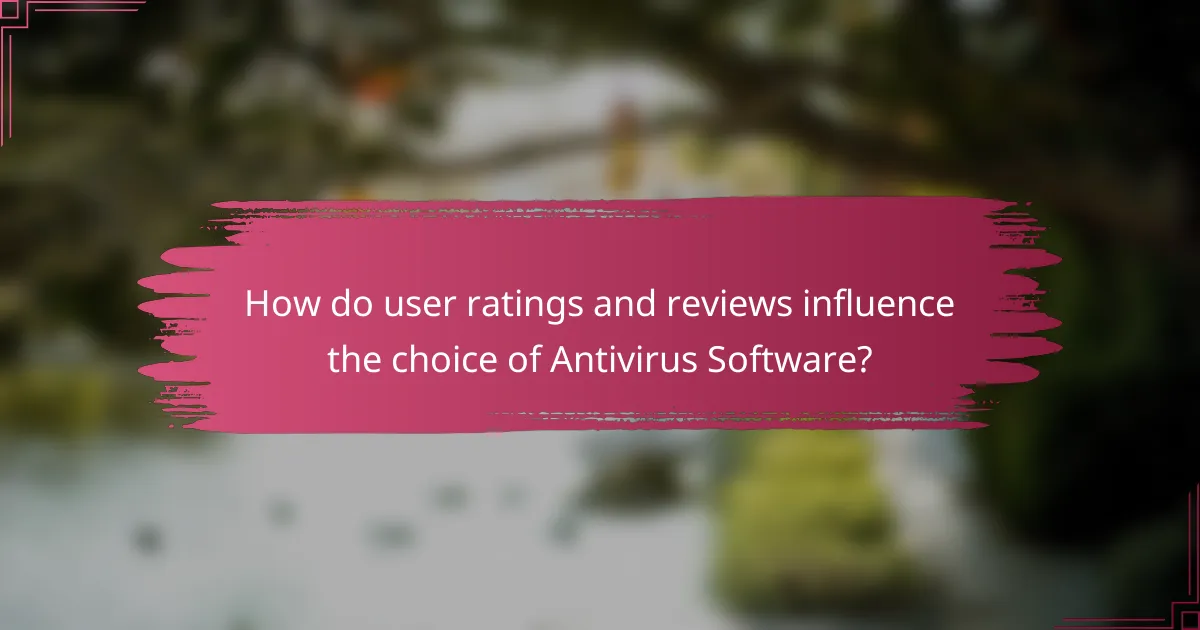
How do user ratings and reviews influence the choice of Antivirus Software?
User ratings and reviews significantly influence the choice of antivirus software. Consumers often rely on the experiences of others to gauge effectiveness and reliability. High ratings typically indicate user satisfaction and trust in the software. Conversely, low ratings can deter potential users due to concerns about performance. Research shows that 70% of consumers trust online reviews as much as personal recommendations. This statistic highlights the importance of user feedback in decision-making. Additionally, detailed reviews provide insights into specific features and usability, aiding users in making informed choices. Overall, user ratings and reviews serve as critical factors in the selection process for antivirus software.
What criteria should be used to assess user ratings?
User ratings should be assessed based on several key criteria. These criteria include the overall rating score, the number of ratings submitted, and the distribution of ratings. The overall rating score provides a quick snapshot of user satisfaction. A higher number of ratings indicates a broader user base and can enhance reliability. The distribution of ratings reveals patterns in user experiences, highlighting both positive and negative feedback.
Additionally, the recency of ratings is important. Recent ratings reflect current performance and user satisfaction. The context of the ratings, such as detailed reviews and comments, offers insights into specific strengths and weaknesses. Finally, the credibility of the platform where ratings are posted can influence the trustworthiness of the ratings. Ratings from reputable sources tend to be more reliable.
How do expert reviews compare to user experiences?
Expert reviews tend to provide a more technical and analytical perspective compared to user experiences. Experts evaluate antivirus software based on criteria like performance, security features, and usability. They conduct controlled tests and benchmark comparisons, which yield objective results. User experiences, on the other hand, reflect personal interactions and satisfaction levels. Users often share insights on ease of use, customer support, and real-world effectiveness.
Research indicates that expert reviews can highlight specific strengths or weaknesses that users may overlook. For instance, a study by AV-TEST Institute shows that expert evaluations often identify vulnerabilities in software that users might not encounter directly. Additionally, user reviews can reveal long-term performance issues that may not be evident in expert testing phases.
Overall, combining both expert reviews and user experiences provides a well-rounded view of antivirus software effectiveness. Users benefit from the in-depth analysis of experts while experts gain context from actual user interactions.
What common issues do users report with Antivirus Software?
Common issues users report with antivirus software include false positives, which occur when legitimate files are flagged as threats. Users often experience performance slowdowns due to resource-intensive scans. Compatibility problems with other software can lead to system instability. Some users find the user interface confusing or unintuitive. Subscription renewal issues can arise, causing unexpected charges. Additionally, inadequate customer support can frustrate users seeking assistance. Lastly, some antivirus programs fail to detect newer malware effectively, leaving systems vulnerable.
What are the top-rated Antivirus Software options based on user feedback?
Norton, Bitdefender, and Kaspersky are top-rated antivirus software options based on user feedback. Norton is praised for its comprehensive protection and user-friendly interface. Bitdefender is noted for its strong malware detection rates and minimal system impact. Kaspersky is recognized for its robust security features and excellent customer support. User reviews consistently highlight these software options for their effectiveness and reliability in protecting against threats.
What unique features set the top Antivirus Software apart?
Top antivirus software is distinguished by features such as real-time protection, advanced malware detection, and multi-device compatibility. Real-time protection continuously scans for threats, ensuring immediate response to potential attacks. Advanced malware detection uses machine learning algorithms to identify new and evolving threats. Multi-device compatibility allows users to protect various devices under a single subscription. Some antivirus solutions offer a VPN for enhanced privacy and secure browsing. Others include a password manager to help users manage their credentials securely. Additionally, cloud-based scanning improves detection rates by leveraging extensive databases. These unique features collectively enhance user security and overall experience.
How do pricing models affect user satisfaction with Antivirus Software?
Pricing models significantly influence user satisfaction with antivirus software. Users often associate higher prices with better quality and more features. Subscription-based models provide ongoing updates and support, enhancing user experience. One-time purchase models may lead to dissatisfaction if users feel neglected after the sale. Research indicates that 70% of users prefer subscription services for continuous protection. This preference stems from the perception of value and security. Additionally, transparent pricing fosters trust, while hidden fees can lead to frustration. Overall, effective pricing models align with user expectations, impacting satisfaction levels.
What tips can help users choose the best Antivirus Software for their needs?
To choose the best antivirus software, users should evaluate their specific needs. First, identify the types of devices that require protection, such as PCs, Macs, or mobile devices. Next, consider the level of security needed, including features like real-time scanning, malware protection, and firewall capabilities. Users should also check for compatibility with their operating system.
Cost is another important factor. Compare subscription plans and features offered at different price points. Research user reviews and ratings to gauge the effectiveness of the software. Look for independent lab test results from organizations like AV-Test or AV-Comparatives for objective assessments. Finally, assess the quality of customer support provided by the antivirus company. These steps will help users select an antivirus solution that best fits their requirements.
Top Antivirus Software is designed to detect, prevent, and remove malware from devices, utilizing various techniques such as signature-based detection and real-time monitoring. This article provides an overview of key features, including malware detection, automatic updates, and user-friendly interfaces, while also highlighting the benefits of enhanced device security and system performance. Additionally, it discusses the impact of user ratings and expert reviews on software selection, common user-reported issues, and tips for choosing the best antivirus solution based on individual needs. Overall, the content aims to equip readers with essential knowledge for understanding and selecting effective antivirus software.
